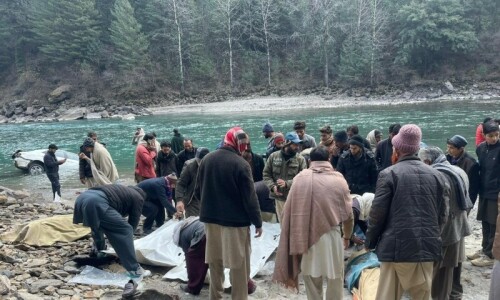The Rawalpindi Medical College (RMC) was established back in the 1970s, with an aim to open new doors for research and development in medical studies.
The college was later upgraded to university level in May 2017 and renamed Rawalpindi Medical University.
Rawalpindi Medical College was first established in Faisalabad on March 18, 1974 and later shifted to Rawalpindi on November 5, 1974 in an incomplete building on Tipu Road, which was the science block of Gordon College. The building was later handed over to Rawalpindi Medical College.

The founding principal of RMC was Prof Abdul Latif under whose tenure student hostels, staff colony and auditorium were built. Apart from his own speciality of anatomy, he completed all the other faculties.
The RMC managed to acquire the Holy Family Hospital from the missionary church and Central Government Hospital from the federal government of the time. The Central Government Hospital later became the Rawalpindi General Hospital and is now known as Benazir Bhutto Hospital.
The District Headquarters Hospital was also affiliated with the college as the first teaching hospital.
Prof Mohammad Nawaz was the second principal while Prof Mohammad Iqbal, who was the professor of surgery, later became the principal. They were the pioneer team that established all components of the RMC.

Prof Iqbal and Prof Saad Rana worked hard to set up the New Teaching Block in the Holy Family Hospital with the help of Islamic Development Bank.
The legacy was taken forward by subsequent principals.
One of them was Prof Mubashir Malik who established the department of psychiatry and worked to develop its international collaborations.
The Department of Medical Education and the Institute of Allied Health Sciences were set up in 2007 during the tenure of Prof Musadiq Khan.
He also started the new teaching block in Holy Family Hospital Rawalpindi as well as ICU and CCU.
First Rawalian principal Prof Mohammad Umar, after taking over the office in 2013, restructured the undergraduate training programme by establishing the purpose built Department of Medical Education (DME), upgraded student libraries, cafeteria, student section and hostels.

RMU has produced many doctors who are serving in the United Kingdom, the US, Australia, New Zealand and many other countries.
Apart from this many RMU graduates also joined civil service and some became politicians.
MNA from Islamabad Dr Tariq Fazal Chaudhry, Pakistan’s High Commissioner in UK Dr Mohammad Faisal Deputy Commissioner of Rawalpindi Dr Hassan Waqar Cheema, Dr Mazhar Azeem Chaudhry, Naveed Zafar Janjua, renowned actor Syed Jibran and many others are some of the names who had graduated from the RMU.
The university has two campuses. The old campus is on Tipu Road while the new one is on the premises of Holy Family Hospital. More than 4,000 students including 3,000 female students are getting education while the university had more than 10,000 alumni in Pakistan and above 3,000 abroad.
RMU Vice Chancellor Prof Dr Mohammad Umar said the RMU had emerged as a hub for cutting-edge research, fostering an environment that encouraged inquiry and exploration.
“Our researchers have made ground breaking contributions to various medical disciplines, addressing critical health challenges and advancing the frontiers of medical knowledge. Collaborations with renowned institutions and the publication of research findings in reputable journals underscore our commitment to pushing the boundaries of medical science,” Dr Umar said.
He said the university’s impact extended beyond the walls of our classrooms and laboratories.
The RMU remains dedicated to community engagement and outreach programmes, addressing the healthcare needs of the local population.
Our medical professionals and students actively participate in health camps, awareness campaigns, and initiatives aimed at promoting public health and well-being, he added.
He said that RMU’s ethos as a research-intensive university was based on valuing diversity of ideas, opinion and thought to make the impossible – possible.
Dr Umar said the RMU research framework was a living example of the systematic and dedicated approach of the university to inculcate research culture from the very beginning in the academic lives of its students to prepare them as researchers and change makers of the future.
He said the university had designed a research curriculum for undergraduates, postgraduates and faculty members and actively published research in reputable journals.
“It offers 12 different diploma programmes, seven certificate courses, and PhD programmes. RMU had establishing a state-of-the-art research lab complex through a multi-billion rupee project with the assistance of the Higher Education Commission (HEC),” he added.
Additionally, Dr Umar said the university had an examination department that catered to the needs of national and international students with credentials.
He said the RMU had also expanded its facilities with the addition of two new specialised allied hospitals.
The RMU vice chancellor said these hospitals provided high-quality patient care and served as training centres for doctors.
He said the Rawalpindi Medical University was the first to initiate the emergency foundation programme in collaboration with the Royal College of Emergency Medicine, UK.
“The university has also fostered collaborations with national and international universities in the US and UK, further enhancing its academic and research endeavours,” he added.
Published in Dawn, November 25th, 2024













































Dear visitor, the comments section is undergoing an overhaul and will return soon.